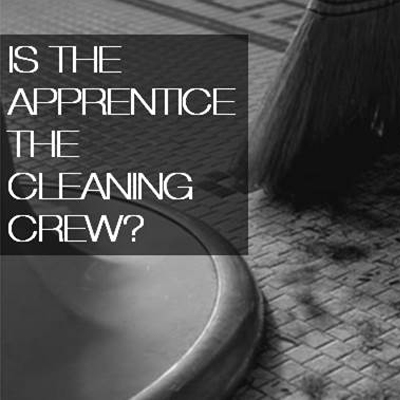Is a Salon Apprentice the Cleaning Crew?
You work your butt off in cosmetology school soaking up as much knowledge on cutting, color and styling that you can. You’re anxious to get out on the floor and have your own clients, but first, you need some experience. That’s the beauty of an apprenticeship. You get to learn the ins and outs of running a salon, and you get to work on actual paying clients. It’s a great learning experience. But what if you don’t feel like you’re learning anything? That’s how one BTC Member is feeling. She recently posed this question to BTC’s Facebook Page:
“I graduated from cosmetology school over a year ago, and right out of school, I started at a new commission salon. I worked there for about nine months, but I had no further education. I decided to leave and go to a much busier/ nicer salon to do an apprenticeship. I really like the salon I’m at, but the stylist I’m assisting has been doing hair for about 30 years and is very old school. She is constantly double booked, and I have to keep her on schedule. I don’t feel like I’m learning anything from her and all she wants me to do is clean the salon and do 10 different things at once. I pretty much do everything, except hair. Should I just tough it out until I can be on the floor? Or should I mention something to her and the owner? The owner is an educator and I feel like he would understand, but I don’t want to lose this opportunity over this issue. Am I expecting too much out of this apprenticeship or do I have the right to be frustrated?”
An apprenticeship is supposed to teach, so if you don’t think you’re learning anything should you speak up, or keep quiet and wait it out? Our BTC Members weigh in on this tricky situation! Here’s what they had to say.
You ARE Learning!
Beth Nadeau says, “Whether you realize it or not, you ARE learning from her. Time management skills, multitasking, how to treat clients, how NOT to treat client, etc. Have you tried asking her if she needs you to shampoo her clients, or take the perm rods out, anything like that? If you’re waiting for her to toss “nuggets” your way, she probably isn’t going to do it. ASK. Then, if you still feel you’re not getting anywhere, talk to her about it, go to the owner.” Laurie Lynn agrees, “I see this every time. You graduate beauty school and think you’re hot $hi** *and truthfully, maybe you are) but the reality of the situation is, you just graduated. This is not any easy industry to be in for many reasons, and you have to pay your dues just like everyone else. You’ve had no other outside classes, yet you expect to be put on the floor of a high end commission salon?. The salon has a reputation to uphold both in beauty and business. They are not going to throw you out on the floor untested. You say the stylist you are assisting is “old school,” yet always double booked and busy. So obviously this “old school” stylist is doing something right or people wouldn’t be coming to them. So you have a choice. 1. Quit acting like a hot shot and do your job. 2. Quit your job and go work for a chop shop for a few years to gain some experience, or 3. TAKE SOME CLASSES.”
Watch and learn suggests Lori Randazzo Messina. “We had an apprentice that trained with my husband) who is a colorist—she held foils, she shampooed hair, got coffee for his clients etc.—she did this for a few years. She is now a sylist on the floor with a very good clientele, and guess who my husband’s clients are going to when he retired!” Lisa Schwinden says it’s all about baby steps. “Maybe she’s grooming you to take over here clientele—she could be testing you to see if you’re worth it.” Suck it up advises Jana Sanson. “I used to have to pick-up dry cleaning, get the stylist coffee, get his car cleaned—to name a few hundred thing I did that weren’t salon related. I also had to be there when he needed me. But, really you learn so much this way. Pay attention—every stylist has to pay their dues—your day will come.”
“During my apprenticeship I HATED my mentor,” says Stacey Sandoval Krivchuk. “I was convinced she was the devil with shears! She make me mix her color, shampoo her clients, blow-dry , blow-dry, blow-dry; I was never so happyto be out from under her thumb. When I left and went to another salon I finally realized all the knowl;edge she shares with me and the things I learned while observing, listening and blow-drying over and over again. Not to say I didn’t make errors on my own, but my errors were significantly less than other at my same level. Ten years later and I treasure all the knowledge I gained from her.” Holly Septon-Mattie agrees, “The stylist has 30 years of experience—yes, you are learning! Be a sponge and learn from a master at her craft!”
Jennifer Curry-Bayer asks if the apprentice has taken it upon themselves to be responsible for their education? “Have you asked to bring in models to practice on? Are you taking outside salon classes in person or via the internet? In my experience, if my assistants got comfortable just shampooing and cleaning all day and weren’t asking or wanting to do hair, I would think they weren’t interested in working behind the chair. Speak up! But remember, we are started somewhere, so be humble. But you need to say you are ready to do more, politely and professionally, of course. Also, get used to doing 10 things at once—this is a fast-paced job and for busy, successful stylists—this is our normal day. Also, perhaps you haven’t shown that you are confident and ready to be behind the chair…just a thought!”
Say Something!
Hailey Benedict suggests talking to the owner, but remember, to always sound grateful for what you’ve already received. “Make sure you tell him you appreciate the opportunity you’ve been given. Tell him you are learning so much from the stylist you are assisting on client interaction, booking, scheduling, etc., but that she doesn’t seem to have the time to teach you much about color application, cutting techniques, etc. Ask him how you should go about discussing this with her. Perhaps he will then talk to the stylist for you or set you up with another stylist. At the very least, hopefully he will give you some good ideas on how to talk to her.” Frank Sibillo believes the apprentice should absolutely speak up. “The job of the assistant in the salon is the easiest job in the industry to be taken advantage of by another stylist. Go with your gut, if your educational needs aren’t being met, then you should find an assistant program that actually involves hands-on work. You should be doing blow dries, shampoos, some color application and getting weekly classes. Find a new stylist to assist.”
Joan Walker says it’s time to find a new job. “We all paid our dues with similar situations. I would have quit already and found a new job. The owner most likely knows full well what’s going on. I’d have a talk with him, but in the meantime, I’d be looking for a new opportunity in another salon, as I would be very surprised if he sympathizes with you. If he does and he has a ‘talk’ with her, I would imagine the work situation between the two of you could become a little ‘tense’.” Kate Smith says not to walk away too quickly. “I would talk to the stylist you’re working under and make sure you’re on the same page with what she expects from you. I was once the salon b*tc*, and it made me the hairdresser I am today! Ask lots of questions and be proactive about your education. Maybe if you take the initiative they’ll see you mean business. A lot can be lost due to poor communication, and the sooner you speak up the better.”
“I think if you’re really that frustrated, you should talk to the stylist you are apprenticing under and try to figure something out to facilitate better learning for you,” suggests Mariah Horne. “If you’re apprenticing under her, she does have some obligation to your continued education. If she wasn’t going to do that, she shouldn’t have taken you on. You have to be your own advocate and stick up for yourself (especially in this industry) because no one else is going to do it for you. I agree with some of the other comments that you are still learning things, even though those things aren’t the hands-on portion, they still go hand and in hand with being a successful stylist, but it shouldn’t end there. Try to keep the conversation positive, but make sure you explain exactly what’s bothering you, and some solutions for that.”
“I applaud you for at least asking this question, it shows you care, “ says Kenneth Todd Butzer. Many people in your shoes would just feel that they were owed a chair right out of the gate! Right now, it’s an assistant position, which means you’re doing everything exactly on task. But, if you don’t feel you’re getting the education you need, say something. Be careful not to throw anyone under the bus, as it could come back to haunt you. Whether you know it or not, you are learning, and this situation is temporary. One day your assistant might be coming to you with similar concerns.”
While it seems that the majority of stylists who responded are torn down the middle when it comes to speaking up and doing what you’re told. One BTC Member had another take on the issue. “What ever happened to jumping head first? I completed two years of school and went out in search of a job immediately,” says Missi Allison. “The first few weeks were terrifying…but also made for the BEST learning experience! I made a few minor mistakes, sure…but I also learned a million things from hands-on situations! You can stand next to someone and watch, or you can apply what you (should) have already learned in school and do it yourself. Twenty years later, I would not have done it any differently. I feel sorry for those that don’t take a leap of faith. The very best teacher is actual experience itself.”
Bottom line: if you don’t feel you are getting the education you need to succeed as a stylist on your own, speak up. Just because you’re an assistant doesn’t mean you are going to play “coffee girl” for the rest of your life. But remember, though you may not have worked your way up to hand-on situations, watching and doing the other tasks that make a salon run are just as vital. Also, don’t underestimate your talent. The best stylists and educators in the world are lifelong learners. Just because you graduated doesn’t mean you can’t take classes to work on your skills. That way when you finally get to blow-dry or shampoo clients for yourself, you’ll be ready to go.







